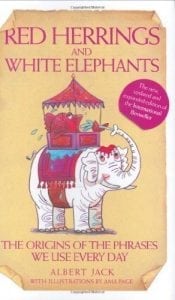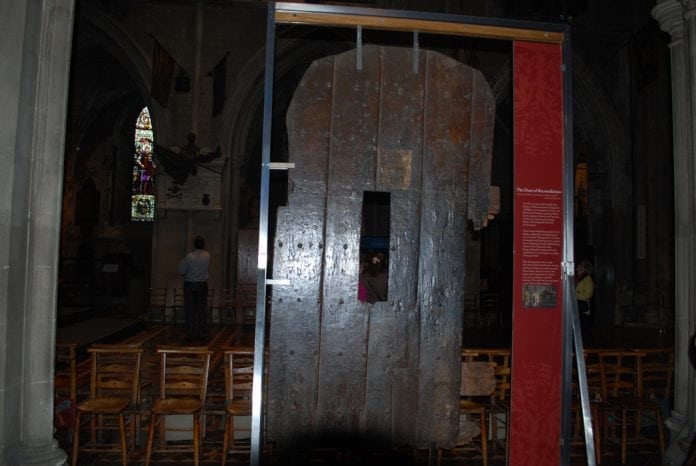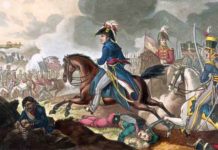To Chance Your Arm is to take an uncalculated risk, where the outcome is completely unknown. A blind bet, if you like.
There are several suggestions for the origin of this saying, one being that military men, whose rank was displayed in the way of stripes on their sleeves, would take battlefield risks, which could equally lead to promotion or demotion, depending on the outcome.
A better explanation (at least one that is more fun) dates back to Ireland as long ago as 1492. During a feud between two distinguished families, the Kildare’s and the Ormond’s, during which Sir James Butler, the Earl of Ormond, and his family took sanctuary inside St Patrick’s Cathedral in Dublin.
The Kildare’s took siege outside until Gerald Fitzpatrick, the Earl of Kildare, decided the feud had gone too far and attempted a reconciliation. But the Ormond’s were suspicious of his offer of peaceful settlement and refused to leave the Cathedral.
As a desperate measure to prove his good intentions Fitzgerald ordered a hole to be cut into the Cathedral door and then thrust his outstretched hand through, putting his arm at the mercy of those inside as it could easily have been cut off.
Instead Butler took his hand and peace was restored. It is not known if that is actually the origin of the phrase, but it should be.
Being Sent to Coventry is to become a social outcast and be ignored by everybody. But why Coventry? During the English Civil War in the mid 1600’s Coventry was a strong Parliamentarian town and Royalist soldiers, captured during the early battles in the Midlands, would be sent to nearby Coventry where they could be certain of a frosty reception.
 Long before the days of prison camps soldiers loyal to the King could only wander around town looking for food or work but locals would refuse to speak with them, even turn their backs and ignoring their presence completely.
Long before the days of prison camps soldiers loyal to the King could only wander around town looking for food or work but locals would refuse to speak with them, even turn their backs and ignoring their presence completely.
Back then the only entertainment to be found was in local Inns but Royalists were barred. Coventry was clearly no place for them but short of walking back to London, and starving to death on the way, there was little option but to stay and scavenge around.
In some cases Royalist soldiers who were deemed as useless or not quite committed to the cause would also be garrisoned near Coventry, assuring them of a miserable posting by way of punishment. The idea being that as no Loyalist wanted to be sent to Coventry, they might show more commitment to the King in battle and avoid the posting.
A Cock and Bull story is likely to untrue and without any real facts supporting it. Imaginative claims that are made without any supporting evidence are usually dismissed as such and some suggest it originates from old fables in which animals speak to each other.
There is, however, a much more reliable source for this phrase. Stoney Stratford is a Buckinghamshire town located almost directly halfway between London & Birmingham and Oxford & Cambridge respectively.
During the great coaching era of the late 18th and early 19th century the town was an important and vibrant stop over point for travellers, tradesmen and mail coaches.
The two main coaching inns were called The Cock and The Bull and both became known throughout the country as the centre of all news travelling either on foot or by horse.
Both Inns, competing for national acclaim, established a rivalry over which could produce the most exciting and scurrilous travellers tales to be passed onto to the major cities and as a result many unbelievable stories were dismissed as Cock and Bull tales.
A Dead Ringer – is a well-known phrase for somebody who looks just like another. In medieval Britain the medical profession was not quite as refined as it is now, and often anybody found not to be breathing was regarded as dead, when they may have been simply unconscious. (And this was also before coma’s were fully understood).
It was not uncommon for bodies to be later exhumed and corpses found with their fingers

worn to the bone, an obvious indication somebody had returned to life and tried to claw their way out of a coffin.
So horrific was this image that the English gentry began mistrusting medical opinions and buried their loved ones with string attached to their wrists, connected to a bell above the grave.
Anybody who returned to life and found themselves prematurely buried could attract attention by ringing the bell and it has been recorded this actually worked. Many ‘bodies’ were exhumed after bells were rung and some people carried on with their normal lives.
But when spotted in the street startled acquaintances would cry to each other ‘That looks just like ‘Jack Jones’ – I thought he was dead’ to which they would receive the reply, ‘Yes, he must be a dead ringer’. And that, believe it or not, is true.
The Full Monty means the whole lot – the maximum available. The Full Monty is a saying that re emerged in the English language in the mid 1980’s as part of the language of Coronation Street dictionary ‘Street Talk’.
It has since been used as the title of several books and a film. There are several suggestion for its origin but the earliest can be traced back to the turn of the century.
In 1904 the tailors Montague Burton (later shortened to Burtons) established their first hire shop in Chesterfield.
They made it possible for men not to hire only a suit for special occasions, but also to hire a complete outfit of suit, shirt, tie, shoes and socks and those opting for the full set were known to be wearing the ‘Full Monty’. – Albert Jack
Albert Jack AUDIOBOOKS available for download here

Money for Old Rope: The Big Book of Everything





































